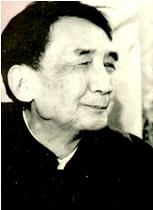Sha Ting
Sha Ting (Chinese: 沙汀)(penname of Yang Zhaoxi) was born on December 19, 1904 in Anxian County, Sichuan Province. He studied at home when a boy and at the age of 17 entered Sichuan No. 1 Normal School in Chengdu, where he was exposed to revolutionary ideas. After graduation in 1926, Sha Ting studied further in Nanjing and Beijing, but returned to Sichuan that winter during the height of the revolution throughout China. He then took part in revolutionary work in his home province and joined the Communist Party of China in 1927. After Chiang Kai-shek betrayed the revolution and imposed the White Terror wherever he held power, Sha Ting had to leave Sichuan and in 1929 went to Shanghai, where he met his classmate Ai Wu and began writing. Soon after the publication of his first short story "Kerosene from Russia" in 1931, Sha wrote to Lu Xun , the pioneer of Chinese modern literature, to ask his advice on the issue of subject matter. After the publication of Navigation Route Beyond the Law, a collection of short stories, he joined the China league of Left-Wing Writers headed by Lu Xun and became one of its talented, progressive young members.
Later on, with Mao Dun's help, Sha made up his mind to write about what he was most familiar with, and he wrote a series of new works, such as "Withdrawal," "In the Family Temple," and "The Deputy Magistrate." His grim stories about the sufferings of innocent people under the barbarous rule of the Kuomintang regime aroused readers' indignation.
After the outbreak of the War of Resistance against Japan in 1937, Sha left Shaghai for his home province. During the winter of the following year, he went with He Qifang and Bian Zhilin to Yan'an, where he first worked as the acting director of the Chinese department at Lu Xun Arts Institute and then made a trip to the resistance bases in northwest Shanxi and central Hebei held by the Communist Party. In 1940, he returned to Chongqing with a wider vision as the result of this experience. New ideas became evident in his literary creations and his output increased. Apart from a number of short stories such as "A Journey by Boat," "Passing the Barrier," and "The Story of Old Droopy," he published the biographical work Notes on He Long and the short novel The Magnet. His short story "In a Teahouse" is most representative. In it, the writer gives colorful and comic descriptions of the intrigues among the rival landlord factions, at the same time exposing the hypocrisy of the new county magistrate's pretended reforms.
Soon after the Southern Anhui Incident in 1941, Sha was forced to hide in the mountains not far from his native province, where he wrote many short stories, including "The Outcry," and three novels: The Gold Mine, Caged Animals, and Returning Home. In The Gold Mine, the author describes the fight between local landlords and scoundrels over a gold mine, while in other works he reflects the people's opposition to the civil war and their hopes for the collapse of the Chiang Kai-shek regime.
The establishment of the People's Republic of China in 1949 marked another chapter in Sha's writing. After seeing and taking part in the national construction and the cooperative movement in the villages, Sha wrote many stories dealing with the new life, the best of these are "Lu Jiaxiu," "The Contest," and "Old Wu." From depicting the sufferings of the people in old China he turned now to write about the peasants of a new type, and these post-Liberation stories have a lyrical style quite unlike his former bitter satire. Immediately after the fall of the Gang of Four, Sha took up his pen again and produced three short novels (Qingtong Mountain Slope, Muyu Hill, and Red Stone Beach) in succession.
Sha Ting died on December 14, 1992 in Chengdu, Sichuan at the age of 88.
His main works include The Magnet (1942), "In a Teahouse" (1961), "The Contest" (1961), and "The Story of Old Droopy" (1964).
